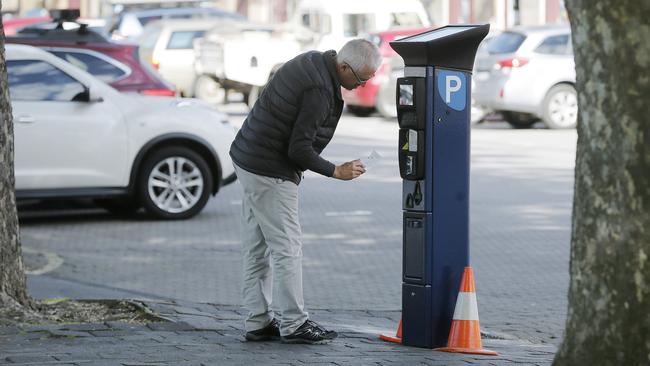Meter woes mar our city
Since their introduction last year, Hobart’s new, modern parking meters have joined the cable car and building heights as topics which many locals have a very strong opinion indeed.

Opinion
Don't miss out on the headlines from Opinion. Followed categories will be added to My News.
SINCE their introduction last year, Hobart’s new, modern parking meters have joined the cable car and building heights as topics which every local has a very strong opinion indeed.
The new meters seemed everything a modern forward-looking city could ask for. The solar-powered smart meters take coins and credit cards and are accompanied by a handy smartphone app, giving motorists a range of convenient choices about how to pay for their parking.
But their introduction has been anything but smooth. For many people, the new meters are hard to use: their tiny screens hard to read, their irksome menus far from intuitive, their operation ponderous. Hobart City Council was even, memorably, forced to run classes in how to use them.
At the same time the meters were introduced, so too were in-ground sensors to alert parking officers exactly how long a car been parked in a particular spot. Parking enforcement, something which has always been pursued with an unseemly zeal in Hobart, was suddenly being delivered with a level of efficiency hitherto unseen from any other government service.
COUNCIL’S GM SETS IT STRAIGHT ON FEEDING METERS
Hapless parkers can now safely expect that a parking officer, bedecked with a rolling body-worn camera would be summoned by an unseen hand to photograph their vehicle from every angle and issue a ticket seemingly within nanoseconds of their meter expiring.
It seemed to many that the council might be taking the issue a little too seriously.
In an article in today’s Talking Point pages the council’s general manager Nick Heath points out that in fact, the opposite has been true for many years.
It is the motorists of Hobart who have been lax in their habits. Unknown and unacknowledged to anyone, bad habits have been ingrained and “feeding the meter” to overstay in a parking spot has become a cultural phenomenon, a dirty secret exposed by a network of underground sensors. Bad habits are hard to break, but we are being required to be scrupulously observant in of parking time limits and restrictions., and it is not proving popular.
Mr Heath rightly points out that in our increasingly congested city, street parking spots are a valuable commodity, whose frequent turnover ensures that they are available for more people.
He says he makes no apology for the more diligent enforcement. He does however apologise for the problems with the rollout of the meters, and it is here that the motorists are not at fault.
Surely such a modern system could be modified to prevent people from paying for more parking than was allowed, or to extend their stay for longer than they are entitled.
Council has some work ahead, to iron out the kinks in the system and to convince the public of the merits of the system. But it must be acknowledged too that the onus is also on motorists, to mend their errant ways. We all must obey the law when it comes to parking.


